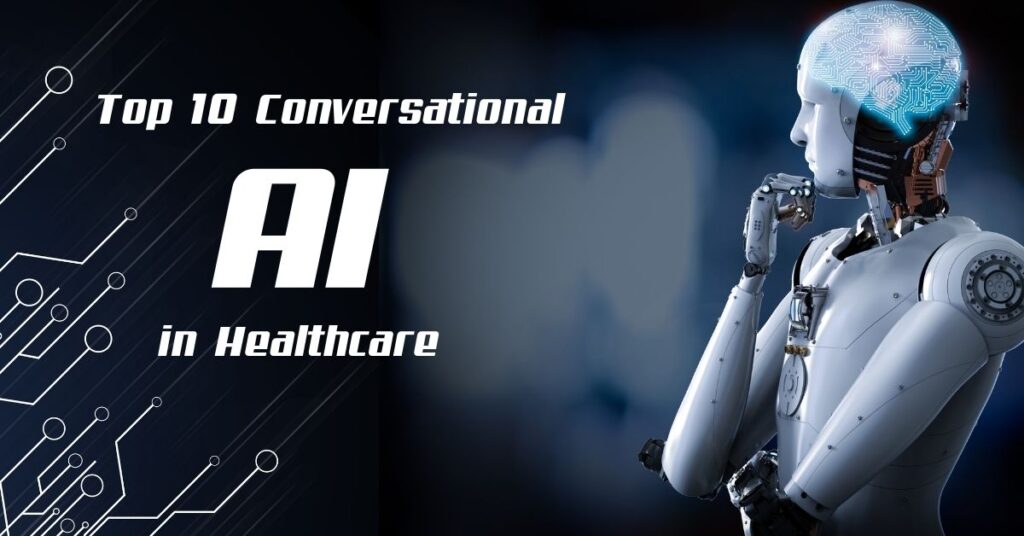
The rapid advancement of AI in healthcare is offering new opportunities and challenges for improving health outcomes, reducing costs, and enhancing patient experiences. The benefits of AI in healthcare are becoming increasingly evident as it streamlines processes, assists in diagnostics, and supports healthcare professionals in delivering more efficient and effective care.
According to a report by Grand View Research, the global AI healthcare market is expected to reach $187 billion by 2030, growing at a compound annual growth rate of 41.5%. Several factors are contributing to this growth, such as improved algorithms, increased data access, cheaper hardware, and 5G technology.
In this article, we will explore some of the multifaceted uses of AI in healthcare, including data analysis and diagnosis, enhancing efficiency, improving the patient experience, and data collection and sharing. We will also look at a case study of IBM’s Watson Assistant AI healthcare chatbots, which provide innovative solutions for patient empowerment and communication. Finally, we will discuss some of the ethical and regulatory issues surrounding AI in healthcare, and the need for governance and oversight.
Data Analysis and Diagnosis
One of the most prominent applications of AI in healthcare is data analysis and diagnosis. AI and machine learning can rapidly analyze vast amounts of health data, such as electronic health records (EHRs), medical studies, clinical trials, and genetic information. This can help healthcare providers gain insights into patient conditions, treatment options, and best practices.
AI can also improve diagnosis and risk prediction by identifying patterns and anomalies in health data. For example, AI can help detect skin cancer by analyzing images of skin lesions and comparing them with a database of known cases. AI can also enhance radiology diagnostics by interpreting X-rays, CT scans, MRI scans, and other imaging modalities with high accuracy and speed.
Enhancing Efficiency in Healthcare
Among the benefits of AI in healthcare is enhancing efficiency and reducing human errors, which is achieved through advanced algorithms and data analysis. AI can streamline administrative workflows, reduce paperwork, and automate tasks such as scheduling appointments, billing, coding, and claims processing. This can save time and money for healthcare providers and patients.
AI can also improve patient care and communication by providing virtual nursing assistants and AI-powered chatbots. These tools can monitor patient symptoms, provide reminders, answer questions, offer support, and triage cases. For example, Babylon Health is a UK-based company that provides an AI-powered app that allows users to check their symptoms, consult with doctors, and access their health records.
AI can also reduce medication dosage errors and risks in surgeries by providing decision support systems and robotic assistance. For example, IBM’s Watson for Oncology is an AI system that helps oncologists prescribe personalized cancer treatments based on evidence-based guidelines. AI can also assist surgeons in performing complex procedures with precision and accuracy.
AI can also prevent fraud and abuse in healthcare by identifying unusual billing patterns, unnecessary tests, duplicate claims, and other anomalies. This can save billions of dollars for the healthcare system and protect patients from harm.
Improving the Patient Experience
AI can also improve the patient experience by facilitating better communication between patients and healthcare providers. AI can provide natural language processing (NLP) capabilities that enable voice recognition, speech synthesis, sentiment analysis, and translation. This can help patients express their needs and preferences, understand their diagnoses and treatments, and access information in their preferred language.
AI can also reduce treatment costs and enhance health outcomes by providing personalized medicine and precision medicine. Personalized medicine refers to tailoring treatments to individual characteristics such as genes, environment, lifestyle, and preferences. Precision medicine refers to targeting treatments to specific subgroups of patients based on molecular biomarkers or other criteria. For example, AI can help design drugs that target specific mutations or receptors in cancer cells.
AI can also improve health monitoring, early disease detection, and tracking infectious diseases like COVID-19. AI can use wearable devices, sensors, apps, and other tools to collect real-time data on vital signs, activity levels, sleep patterns, mood states, and other indicators. This can help patients manage their chronic conditions or prevent potential complications. AI can also use computer vision, NLP, geospatial analysis, social media mining, and other techniques to track the spread of diseases like COVID-19.
Related Post: The Top 10 Conversational AI for Healthcare in 2024
Benefits of AI in Healthcare : Data Collection and Sharing
AI can also streamline data collection and sharing in healthcare by providing interoperability standards, data integration platforms, and data security measures. This can benefit healthcare providers, researchers, pharmaceutical companies, and drug safety agencies. For example, AI can help collect and share adverse drug reaction (ADR) reports from various sources, such as EHRs, social media, and online forums. This can help monitor and prevent drug-related harms and improve pharmacovigilance.
However, AI also poses some challenges and risks for data collection and sharing in healthcare, such as bias, transparency, and privacy. Bias refers to the unfair or inaccurate representation of certain groups or individuals in health data or AI models. Transparency refers to the explainability and accountability of AI decisions and actions. Privacy refers to the protection and control of personal health information.
To address these concerns, there is a need for ethical and regulatory governance of AI in healthcare. The World Health Organization (WHO) has developed six consensus principles for ethical AI use in health:
- Protecting human autonomy
- Promoting human well-being and safety and the public interest
- Ensuring transparency, explainability and intelligibility
- Fostering responsibility and accountability
- Ensuring inclusiveness and equity
- Promoting AI that is responsive and sustainable
Case Study: IBM’s Watson Assistant AI Healthcare Chatbots
Let’s delve into the fascinating world of healthcare and explore the remarkable benefits of AI in healthcare through a case study featuring IBM’s Watson Assistant. This exceptional AI platform empowers businesses to create and deploy conversational agents or chatbots, showcasing the transformative potential of AI in healthcare.
IBM has partnered with several healthcare organizations to provide Watson Assistant AI healthcare chatbots, which empower patients and provide quick answers. For example,
- Mayo Clinic uses Watson Assistant to provide a COVID-19 chatbot that helps users assess their symptoms, access testing information, and get reliable guidance.
- Humana uses Watson Assistant to provide a virtual assistant that helps members manage their health benefits, access wellness programs, and get personalized support.
- CVS Health uses Watson Assistant to provide a pharmacy chatbot that helps customers refill prescriptions, check order status, and get medication reminders.
These examples show how IBM’s Watson Assistant can improve patient engagement, satisfaction, and loyalty by providing convenient, accurate, and timely information and assistance.
Conclusion
The benefits of AI in healthcare are abundantly clear as it revolutionizes the healthcare industry on multiple fronts. From data analysis and diagnosis to bolstering efficiency and elevating the patient experience, AI is a transformative force in healthcare. Furthermore, AI plays a pivotal role in data collection and sharing, promising a myriad of benefits for improving health outcomes, reducing costs, and enhancing patient experiences.
Nonetheless, it’s important to acknowledge that the benefits of AI in healthcare come hand in hand with challenges and risks, particularly in the realm of data collection and sharing. Concerns related to bias, transparency, and privacy must be addressed. To this end, the healthcare sector urgently requires ethical and regulatory governance of AI, aligning with the World Health Organization’s six consensus principles for the ethical utilization of AI in health.
AI is an exciting and promising field that has the potential to revolutionize healthcare. By harnessing the power of AI, we can create a better future for health.
Frequently Asked Questions (FAQs)
What is artificial intelligence (AI) in healthcare?
Artificial intelligence (AI) in healthcare is the use of computer systems and software to perform tasks that normally require human intelligence, such as data analysis, diagnosis, decision-making, and communication.
What are the benefits of AI in healthcare?
AI in healthcare offers a multifaceted approach to better healthcare delivery. It enhances health outcomes by providing accurate diagnoses, personalized medicine, and early disease detection. Simultaneously, AI reduces costs through streamlined administrative workflows, task automation, and fraud prevention. Additionally, it improves patient experiences by facilitating communication and virtual assistance while also minimizing treatment expenses. These combined benefits signify AI’s potential to revolutionize the healthcare industry, making it more efficient, cost-effective, and patient-centric.
What are the challenges and risks of AI in healthcare?
AI in healthcare presents significant challenges and risks that demand attention. Bias, whether systemic or inadvertent, can lead to unfair or inaccurate representations within health data and AI models, potentially affecting the quality of care provided. Ensuring transparency in AI decision-making is essential to maintain accountability and trust, especially in critical healthcare scenarios. Additionally, safeguarding patient privacy and maintaining control over personal health information are paramount concerns, requiring robust measures to protect sensitive data from unauthorized access and misuse. Addressing these challenges is imperative to harness the full potential of AI while upholding ethical and secure healthcare practices.
How can we address the ethical and regulatory issues of AI in healthcare?
In order to effectively tackle the ethical and regulatory challenges arising from the integration of AI in healthcare, governance and oversight are imperative. The World Health Organization (WHO) has established six fundamental consensus principles for the ethical utilization of AI in the health sector. These principles emphasize the protection of human autonomy, the promotion of human well-being, safety, and the public interest, the necessity for transparency and intelligibility in AI systems, the cultivation of responsibility and accountability among stakeholders, the assurance of inclusiveness and equity, and the encouragement of AI development that is both responsive and sustainable. These principles serve as a crucial framework for guiding the responsible and ethical implementation of AI technologies in healthcare, ensuring that they benefit humanity while safeguarding individuals’ rights and well-being.
What are some examples of AI solutions in healthcare?
There are many examples of AI solutions in healthcare, such as:
– IBM’s Watson Assistant: An AI platform that enables businesses to build and deploy conversational agents or chatbots that empower patients and provide quick answers.
– Babylon Health: A UK-based company that provides an AI-powered app that allows users to check their symptoms, consult with doctors, and access their health records.
– IBM’s Watson for Oncology: An AI system that helps oncologists prescribe personalized cancer treatments based on evidence-based guidelines.

